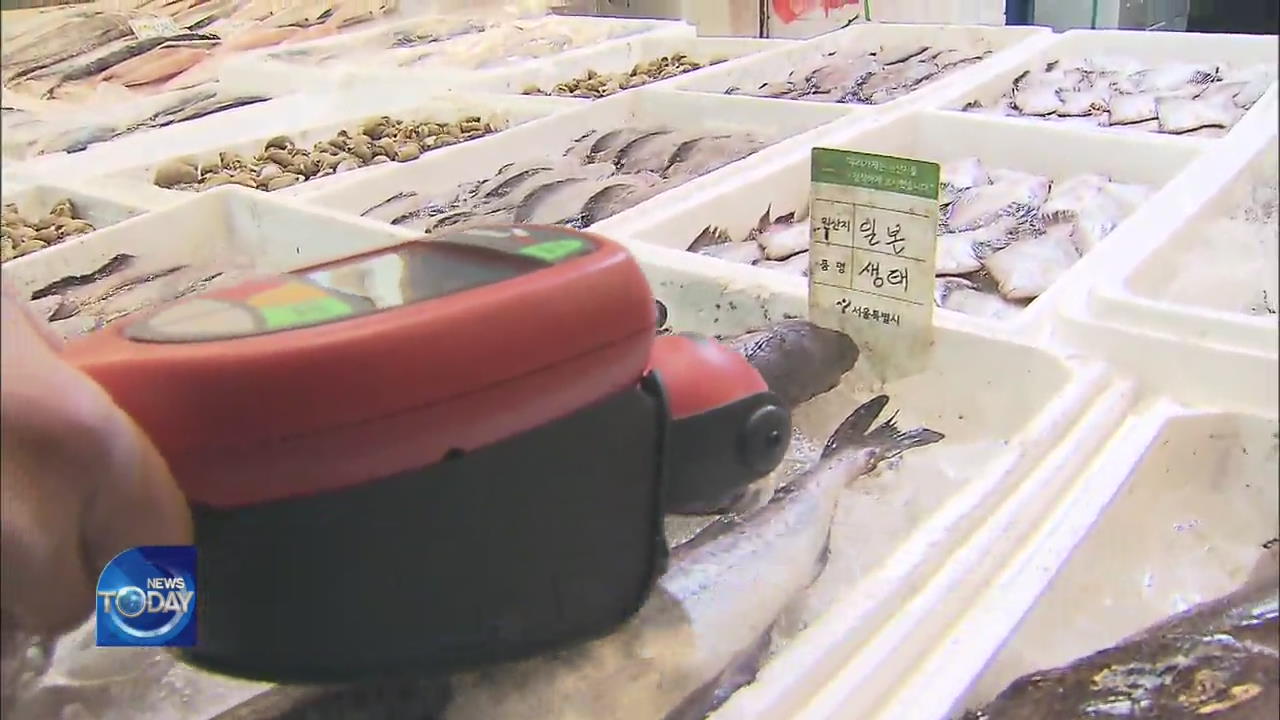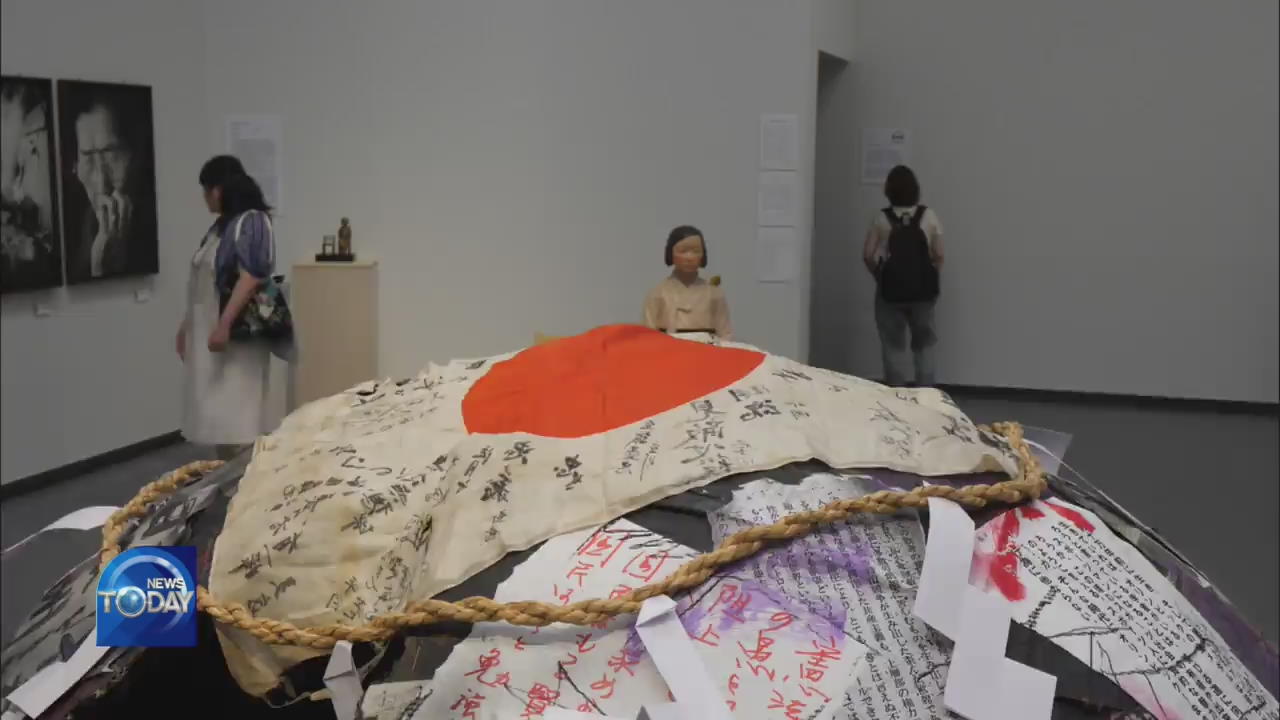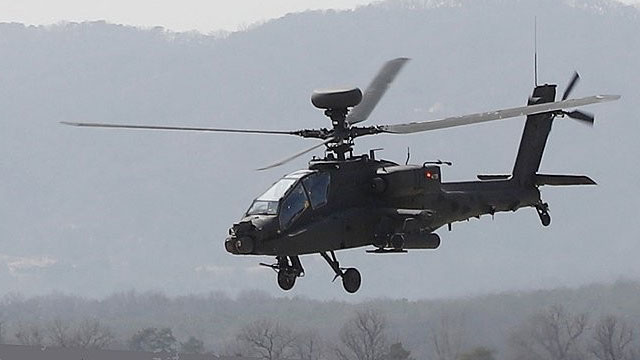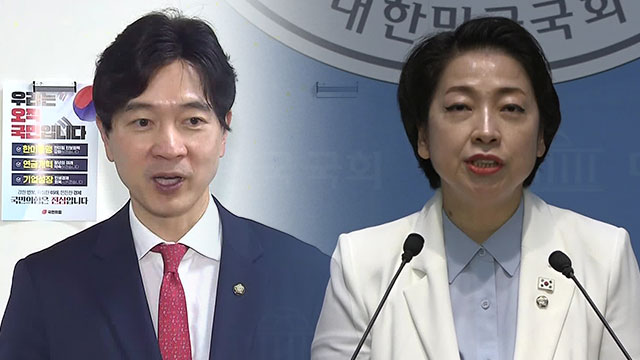RADIOACTIVITY CHECKS ON JAPANESE IMPORTS
입력 2019.08.06 (15:04)
수정 2019.08.06 (16:53)
읽어주기 기능은 크롬기반의
브라우저에서만 사용하실 수 있습니다.
[Anchor Lead]
The South Korean government is considering tightening radioactivity inspections on items imported from Japan. Ahead of the 2020 Summer Olympic Games in Tokyo, there's also a possibility of South Korea raising concerns over the issue of radioactivity to pressure japan.
[Pkg]
Since the Fukushima Daiichi nuclear disaster in 2011, the South Korean government has been conducting the highest level of radioactivity inspections on agricultural and fisheries products from Japan's eight prefectures, instead of imposing complete import bans. The government is considering expanding and toughening such safety checks to all categories of imports from Japan.
[Soundbite] HONG NAM-KI(FINANCE MINISTER) : "The government plans to toughen checks first on tours, food and waste products to ensure the safety of the people."
First, in addition to the current radioactivity inspections, Seoul may inspect a greater proportion of Japanese agricultural and maritime imports if they were found to have previously been contaminated with heavy metals or microbes. It is also highly likely that inspections could be toughened on waste materials from Japan, which have been feared to be contaminated with radiation due to their unclear distribution routes. The Ministry of Environment is mulling taking over radioactivity checks on all imports of coal ash waste, plastic waste and scrap iron from Japan, which are used as supplementary materials by domestic cement companies. Currently, importers have conducted the inspections on their own. Ninety-nine-point-nine percent of South Korea's coal ash waste imports come from Japan. Therefore, a tighter customs clearance process will inevitably impose a greater burden on Japan. For manufactured products imported from Japan, the South Korean government is also considering more than doubling the number of samples subject to inspections.
[Soundbite] JOO WON(HYUNDAI ECONOMIC RESEARCH INSTITUTE) : "It is highly likely that the government will use the issue of radiation, which is Japan's sore spot, if Tokyo takes more retaliatory measures, which are unbearable for South Korea."
Although it has yet to elaborate on details, the government is expected to soon announce comprehensive measures to toughen safety inspections on imports from Japan.
The South Korean government is considering tightening radioactivity inspections on items imported from Japan. Ahead of the 2020 Summer Olympic Games in Tokyo, there's also a possibility of South Korea raising concerns over the issue of radioactivity to pressure japan.
[Pkg]
Since the Fukushima Daiichi nuclear disaster in 2011, the South Korean government has been conducting the highest level of radioactivity inspections on agricultural and fisheries products from Japan's eight prefectures, instead of imposing complete import bans. The government is considering expanding and toughening such safety checks to all categories of imports from Japan.
[Soundbite] HONG NAM-KI(FINANCE MINISTER) : "The government plans to toughen checks first on tours, food and waste products to ensure the safety of the people."
First, in addition to the current radioactivity inspections, Seoul may inspect a greater proportion of Japanese agricultural and maritime imports if they were found to have previously been contaminated with heavy metals or microbes. It is also highly likely that inspections could be toughened on waste materials from Japan, which have been feared to be contaminated with radiation due to their unclear distribution routes. The Ministry of Environment is mulling taking over radioactivity checks on all imports of coal ash waste, plastic waste and scrap iron from Japan, which are used as supplementary materials by domestic cement companies. Currently, importers have conducted the inspections on their own. Ninety-nine-point-nine percent of South Korea's coal ash waste imports come from Japan. Therefore, a tighter customs clearance process will inevitably impose a greater burden on Japan. For manufactured products imported from Japan, the South Korean government is also considering more than doubling the number of samples subject to inspections.
[Soundbite] JOO WON(HYUNDAI ECONOMIC RESEARCH INSTITUTE) : "It is highly likely that the government will use the issue of radiation, which is Japan's sore spot, if Tokyo takes more retaliatory measures, which are unbearable for South Korea."
Although it has yet to elaborate on details, the government is expected to soon announce comprehensive measures to toughen safety inspections on imports from Japan.
■ 제보하기
▷ 카카오톡 : 'KBS제보' 검색, 채널 추가
▷ 전화 : 02-781-1234, 4444
▷ 이메일 : kbs1234@kbs.co.kr
▷ 유튜브, 네이버, 카카오에서도 KBS뉴스를 구독해주세요!
- RADIOACTIVITY CHECKS ON JAPANESE IMPORTS
-
- 입력 2019-08-06 15:08:25
- 수정2019-08-06 16:53:27

[Anchor Lead]
The South Korean government is considering tightening radioactivity inspections on items imported from Japan. Ahead of the 2020 Summer Olympic Games in Tokyo, there's also a possibility of South Korea raising concerns over the issue of radioactivity to pressure japan.
[Pkg]
Since the Fukushima Daiichi nuclear disaster in 2011, the South Korean government has been conducting the highest level of radioactivity inspections on agricultural and fisheries products from Japan's eight prefectures, instead of imposing complete import bans. The government is considering expanding and toughening such safety checks to all categories of imports from Japan.
[Soundbite] HONG NAM-KI(FINANCE MINISTER) : "The government plans to toughen checks first on tours, food and waste products to ensure the safety of the people."
First, in addition to the current radioactivity inspections, Seoul may inspect a greater proportion of Japanese agricultural and maritime imports if they were found to have previously been contaminated with heavy metals or microbes. It is also highly likely that inspections could be toughened on waste materials from Japan, which have been feared to be contaminated with radiation due to their unclear distribution routes. The Ministry of Environment is mulling taking over radioactivity checks on all imports of coal ash waste, plastic waste and scrap iron from Japan, which are used as supplementary materials by domestic cement companies. Currently, importers have conducted the inspections on their own. Ninety-nine-point-nine percent of South Korea's coal ash waste imports come from Japan. Therefore, a tighter customs clearance process will inevitably impose a greater burden on Japan. For manufactured products imported from Japan, the South Korean government is also considering more than doubling the number of samples subject to inspections.
[Soundbite] JOO WON(HYUNDAI ECONOMIC RESEARCH INSTITUTE) : "It is highly likely that the government will use the issue of radiation, which is Japan's sore spot, if Tokyo takes more retaliatory measures, which are unbearable for South Korea."
Although it has yet to elaborate on details, the government is expected to soon announce comprehensive measures to toughen safety inspections on imports from Japan.
The South Korean government is considering tightening radioactivity inspections on items imported from Japan. Ahead of the 2020 Summer Olympic Games in Tokyo, there's also a possibility of South Korea raising concerns over the issue of radioactivity to pressure japan.
[Pkg]
Since the Fukushima Daiichi nuclear disaster in 2011, the South Korean government has been conducting the highest level of radioactivity inspections on agricultural and fisheries products from Japan's eight prefectures, instead of imposing complete import bans. The government is considering expanding and toughening such safety checks to all categories of imports from Japan.
[Soundbite] HONG NAM-KI(FINANCE MINISTER) : "The government plans to toughen checks first on tours, food and waste products to ensure the safety of the people."
First, in addition to the current radioactivity inspections, Seoul may inspect a greater proportion of Japanese agricultural and maritime imports if they were found to have previously been contaminated with heavy metals or microbes. It is also highly likely that inspections could be toughened on waste materials from Japan, which have been feared to be contaminated with radiation due to their unclear distribution routes. The Ministry of Environment is mulling taking over radioactivity checks on all imports of coal ash waste, plastic waste and scrap iron from Japan, which are used as supplementary materials by domestic cement companies. Currently, importers have conducted the inspections on their own. Ninety-nine-point-nine percent of South Korea's coal ash waste imports come from Japan. Therefore, a tighter customs clearance process will inevitably impose a greater burden on Japan. For manufactured products imported from Japan, the South Korean government is also considering more than doubling the number of samples subject to inspections.
[Soundbite] JOO WON(HYUNDAI ECONOMIC RESEARCH INSTITUTE) : "It is highly likely that the government will use the issue of radiation, which is Japan's sore spot, if Tokyo takes more retaliatory measures, which are unbearable for South Korea."
Although it has yet to elaborate on details, the government is expected to soon announce comprehensive measures to toughen safety inspections on imports from Japan.
이 기사가 좋으셨다면
-
좋아요
0
-
응원해요
0
-
후속 원해요
0










![[HEADLINE]](https://news.kbs.co.kr/data/news/2019/08/06/4257283_10.jpg)

![[속보] 당정 “가용 수단 총동원해 물가 민생 안정에 <br>만전 기하기로”](/data/layer/904/2025/07/20250706_FYttMd.jpg)




이 기사에 대한 의견을 남겨주세요.